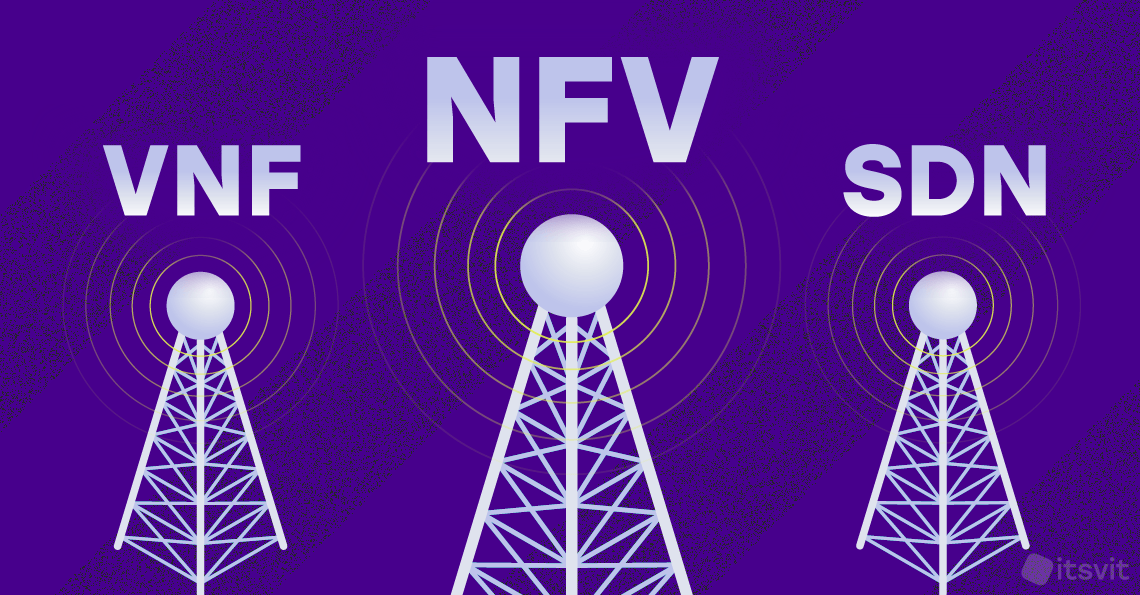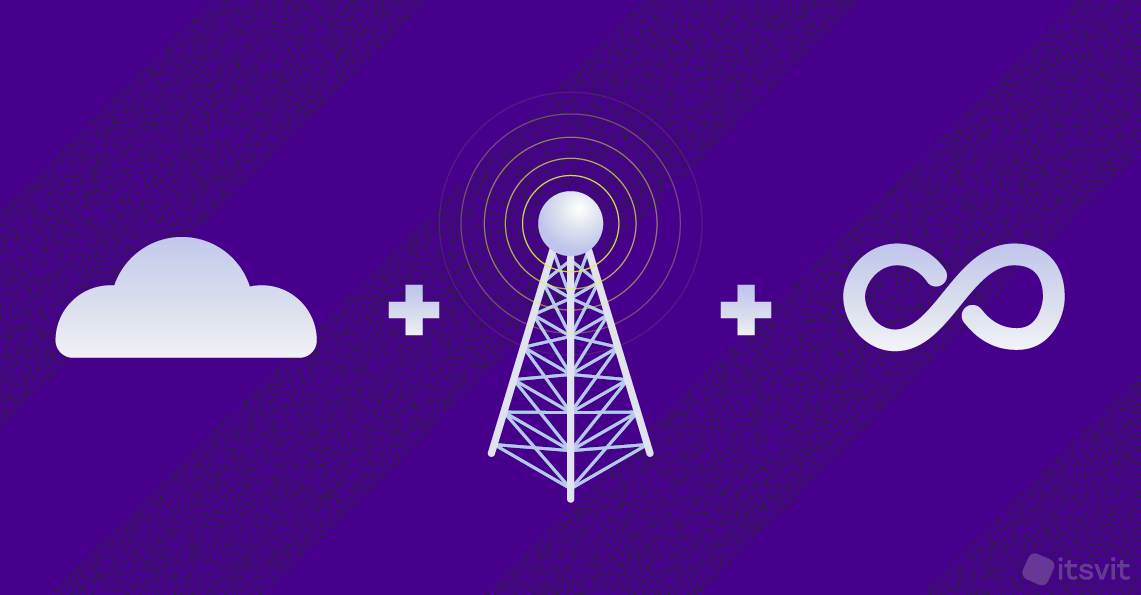Enabling cloud computing for telecom by IT Svit
Many telecom companies based in the US find themselves in need of cloud computing to implement 5G networks. IT Svit provides cloud storage for the telecom industry and fields dedicated teams with wide experience in the telecom cloud services.
If you are a telecom company getting ready for the 5G era, you need to get access to the best cloud computing for telecom. Using cloud storage for the telecom industry ensures safety and high-availability of the data, scalability and ease of maintenance for the infrastructure, but most importantly — cost-efficiency of deployment. IT Svit can help you save a fortune on using cloud computing for the telecom industry instead of buying hardware.
Cloud service configuration for your telecom business
5G networks offer a huge benefit in terms of telecom cloud services — they are built of virtual components, not hardware. This drastically reduces CAPEX and enables simple reconfiguration. IT Svit has ample experience with cloud network management and can help configure any cloud services for the telecom industry.
SDN, VNF and NFV development and management
Cloud computing and DevOps tools provide great opportunities for the telecom industry. Running network functions inside Docker containers atop a virtualized infrastructure helps shorten the time of maintenance and network updates many times. IT Svit has ample experience with containerizing various applications and running containers atop Kubernetes clusters.
Benefits of cloud computing for the telecom industry
With worldwide adoption of 5G networks around the corner, many businesses in the telecom industry face the need to update their hardware, software and processes, before these become legacy and impact your competitiveness. There are huge benefits to be had by adopting the telecom industry cloud services early. First, you can save on upgrading your hardware once and for all. Second, you can reconfigure the infrastructure with ease should the need arise. As a dollar saved is a dollar earned, every forward-thinking company can earn millions by using cloud computing for telecom.
This is possible due to the fact that the upcoming 5th generation of networks is not using the same architecture as all the previous ones. With 3G and 4G, you had to buy the hardware with rigid specifications that could be used for intended purposes only. If you needed to add 2 more cables, you needed to add a whole box with 10 slots, etc. If some connection gets fried, you need to buy a new piece of hardware quite often. If a new gadget is not compatible with your devices — you need to update the drivers, which can result in more compatibility issues, etc.
Thus said, 5G is built on the principles of virtualization to avoid the rigid specifications of software and limitations of the hardware. The three basic principles of 5G are as follows:
- VNF — Virtual Network Functions — all software (drivers) for the main network components are virtualized. This means that all modules are run as Docker containerized applications atop a virtualized Terraform infrastructure.
- NFV — Network Functions Virtualization — the whole network structure runs as a Kubernetes cluster of Docker containers in the cloud, without the need to buy any piece of hardware. Like, ever.
- SDN — Software-Defined Networking — using code to define the network settings and parameters. Ansible and Jenkins are the tools allowing to build and configure 5G networks within minutes, not within hours and days.
Thus said, the 5th generation of networks can be installed for literally no cost, configured in minutes and adjusted on the move should the need arise. This literally saves millions of dollars in terms of CAPEX investments, worktime and reduction of misconfiguration risks. There are many other cloud benefits for telecom.
Advantages of the cloud services for telecom
Cloud storage for the telecom industry ensures all the data is securely stored in the cloud in an encrypted form, is easily available from any device and in any geographical location. This is the high-availability feature, made available by replicating the data across distributed clusters of high-velocity databases. This way, all the data is gathered, processed, stored and streamed in real-time in multiple locations across the globe and even a complete power shutdown in one location will not cripple your operations.
Cloud backup for the telecom industry is the natural consequence of cloud data storage. The data is backed up by replicating it across several database instances in a hybrid cloud, so even if on-prem servers get damaged in any disaster, the data is safe and sound in the cloud. The procedure of cloud backup for telecom can be done in batches or in real-time while you are actually streaming, so not a bit of data is lost, ever.
Cloud scalability ensures your systems can handle any number of visitors and any workload. If the monitoring modules detect workload spikes, they spin up more VNFs in seconds, so your system does not lag or crash. Later on, when the spike is over, the excessive VNFs are shut down automatically to conserve your resources.
Cloud services for telecom are cost-efficient, as they are provided under the Pay-As-You-Go billing model. This means that instead of buying or renting hardware servers in dedicated data centers and paying for them 24/7 regardless of the actual resource consumption ratio, cloud users order virtualized instances with some quotas of resources that can be additionally flexibly adjusted.
For example, if you need more CPU power to process large volumes of information or more RAM to do it faster or more disk space to store it — your cloud instance can be scaled up and down both horizontally and vertically. Most importantly, these resources are available at any time and can be provisioned within seconds upon request — and shut down as quickly and easily.
Does it sound great for you? The only question remains — how to gain access to all these tangible benefits? the answer is — by using DevOps services!
Importance of DevOps cloud services for the telecom industry
Cloud hosting operates quite differently, as compared to working with dedicated servers or virtual machines that are the mainframe of modern 3G/4G telecom networks. Instead of physical bare-metal servers with limited resource capacities, you operate virtualized instances that draw the needed resources from a common pool. When these resources are not needed, they are returned to the pool to be used — and paid for — by other customers.
This is a great and welcome improvement over the existing situation when a telecom company must be constantly investing in buying new hardware, as the old one rapidly becomes legacy and obsolete. Instead, from 5G going onward, no CAPEX will be required to update your systems. The only OPEX needed is the DevOps expertise to operate the cloud, as the existing telecom industry IT professionals rarely have the skills required to enable VNF, NFV and SDN. They have invaluable experience with specific telecom solutions architecture and best practices of its organization, though.
This is why the best way to approach the oncoming transition to 5G networks is by combining the expertise of your telecom industry computing services with a profound DevOps knowledge from a Managed Services Provider like IT Svit. We have ample experience with software delivery and cloud infrastructure management, and we will be able to apply it to replicating your existing IT infrastructure in the cloud, while also optimizing it to future-proof your operations.
Should this sound like an outcome you would like to achieve — contact IT Svit today and we would be glad to provide top-notch cloud computing services for the telecom industry!

